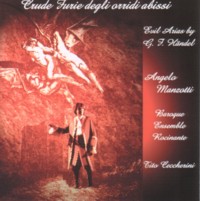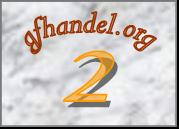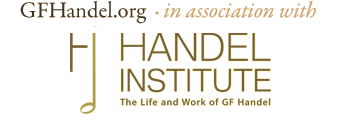"Crude Furie degli orridi abissi - Evil Arias by G. F. Händel"
|

Callisto Records
CLS 0102
1 CD
+ 1 PC & Mac compatible CD-ROM with music (16 mp3 files), English and
Italian booklet with many photos (in html and jpg format) and scores (in
pdf format)
Recorded in 2001.
Released in 2001. |
- Ouverture from Admeto (HWV 22)
- Crude furie degli orridi abissi, sung by Serse from Serse (HWV
40)
- Agitato il cor mi sento, sung by Dardano from Amadigi (HWV
11)
- Pena tiranna, sung by Dardano from Amadigi (HWV
11)
- Voglio che sia l’indegno, sung by Faramondo from Faramondo (HWV
39)
- Nella terra, in ciel, nell’onda, sung by Gernando from Faramondo (HWV
39)
- Concerto grosso Op. 3 No. 3 (HWV 314)
- Vano amore, sung by Alessandro from Alessandro (HWV
21)
- Su! All’armi, sung by Evaneo from Rodrigo (HWV
5)
- Furibondo spira il vento, sung by Arsace from Partenope (HWV
27)
- Voglio stragi e voglio morte, sung by Egeo from Teseo (HWV
9)
- Son stanco… / Deggio morire, sung by Siroe from Siroe (HWV
24)
- A dispetto d’un volto ingrato, sung by Tamerlano from Tamerlano (HWV
18)
Bonus CD (in mp3 format):
- Tu preparati a morire, sung by Ariodante from Ariodante
(HWV 33)
- Trio sonata Op. 2 No. 1 (HWV 386b)
Angelo Manzotti (sopranist)
Ensemble Rocinante (on period instruments)
Director: Tito Ceccherini |
To produce a CD of arias sung by the “baddies”
from Handel operas is a good idea. All the more since many of these arias are
beautiful and rarely recorded. Although several of the choices are
questionable: you can hardly find a character as far from being a villain than
Faramondo, and are Serse, Arsace or Siroe really evil characters? At least
this rather commercial approach is a good occasion to listen to Faramondo’s
great aria “Voglio che sia l’indegno” or the dramatic “Deggio morire”
from Siroe. The programme is really interesting and the presence of a
CD-ROM containing the scores makes such a product being particularly
attractive. However, what about the interpretation?
Once more, the sopranist Angelo Manzotti offers us an extraordinary recording. He sings very high and quite low
notes, but unfortunately, his singing is a demonstration of forcing.
Consequently all those high notes and many others are out of tune and the
vowels are distorted (on a long run you can ear three or four different sounds
on a single vowel!). This frequently renders the text incomprehensible (“Peno
tiranno” is not a rediscovered version of “Pena tiranna”!). Is it
necessary to add that the passagio is weak and the “dramatic intensity”
is too often obtained by an artificial vibrato and quavering recitatives?
There are some moments in the lower lying arias which make one think Manzotti
could have been a reasonable countertenor and some of his variations are
really interesting, but even in alto arias he adds some terribly sung
cadenze. His singing is never moving and not even impressive, just
caricatured and unbearable. Good intentions do not make good singing.
A very interesting programme, an excellent
editorial policy, and a really good Finnish orchestra. Yet even if Manzotti
certainly has some talent, this is unacceptable singing. People interested in
sopranists should instead listen to the young French Philippe Jaroussky,
definitely one of the best yet heard both in concert and on recordings.

© Philippe Gelinaud - February 2002
Return to the G. F. Handel Home Page
Unless
explicitly specified otherwise,
this page and all other pages at this site are Copyright © 2015 by David
Vickers and Matthew Gardner
GFHandel.org credits
Last updated:
August 30, 2020
· Site design: Duncan Fielden, Matthew Gardner and David Vickers
|



